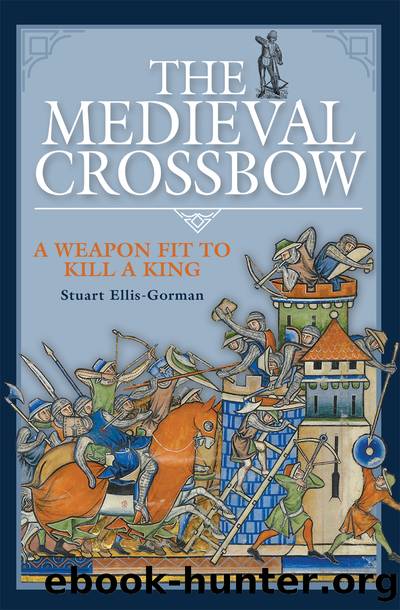The Medieval Crossbow by Stuart Ellis-Gorman

Author:Stuart Ellis-Gorman
Language: eng
Format: epub
Tags: HISTORY / Military / Medieval
Publisher: Pen and Sword
Published: 2022-07-30T00:00:00+00:00
The battle
Entire books have been written about Crécy and its many aspects. It was one of the most famous battles of its age and virtually every contemporary chronicler needed to provide their own take on it, some of them directly at odds with what another author was writing at the same time, which makes untangling the exact events and tactical dispositions of the battle a monumental task for modern historians. For example, most of the contemporary English accounts barely mention the role of the archers â and some do not mention them at all! In their book on the battle Andrew Ayton and Sir Philip Preston devoted over sixty pages to the many fourteenth-century accounts of the battle and the Gordian Knot they present to historians trying to piece together a coherent account of the battle. This book will not attempt to replicate that work, instead it will take a high-level approach to the account of the battle, but readers should bear in mind that the full story of the Battle of Crécy is one of staggering complexity and nuance.16
The Crécy campaign began in July 1346, when Edward III landed the largest army he would ever bring to France at the port of La Hougue in Normandy. Edwardâs landing was unopposed because the Duke of Normandy and many of the local nobility were besieging another English force elsewhere in France. Edwardâs army rampaged across Normandy engaging in multiple skirmishes, including capturing the city of Caen, before crossing both the Seine and Somme rivers and taking up a position near the town of Crécy-en-Ponthieu. King Philip VI (r.1328â50) brought his own army into Normandy and mirrored the English march, eventually pursuing them across both rivers.17
Philipâs army arrived near the English camp at Crécy on the evening of 26 August, having marched all day while the English rested. In several accounts of the battle the French army did not wait until the morning and instead they began their attack on the English position in either the late afternoon or early evening. Jean le Bel (1290â1370), who spoke to participants of the battle, blamed the French attack on an undisciplined army and an unruly nobility refusing to back down from a fight once they could see their enemy before them. However, not every chronicler agreed with this version of events. Geoffrey le Baker (died c.1360), claimed that the French king was too cowardly to fight that evening and the battle took place on the following morning instead. Meanwhile, Giovanni Villani (c.1276â1348), whose account was written the soonest after the battle, described the French arriving at Crécy during the hour of Nones, which was approximately 15.00. Since they still had to deploy their forces for battle the actual fighting would have happened at least an hour later, which would put the battle sometime in the late afternoon.18
Regardless of what time of day it happened, the French seem to have engaged the English before they were ready and suffered a crushing defeat. King Philip was
Download
This site does not store any files on its server. We only index and link to content provided by other sites. Please contact the content providers to delete copyright contents if any and email us, we'll remove relevant links or contents immediately.
The Radium Girls by Kate Moore(12028)
100 Deadly Skills by Clint Emerson(4925)
Rise and Kill First by Ronen Bergman(4789)
The Templars by Dan Jones(4689)
The Doomsday Machine by Daniel Ellsberg(4490)
The Rape of Nanking by Iris Chang(4213)
Killing England by Bill O'Reilly(4001)
Stalin by Stephen Kotkin(3965)
Hitler in Los Angeles by Steven J. Ross(3946)
12 Strong by Doug Stanton(3550)
Hitler's Monsters by Eric Kurlander(3342)
Blood and Sand by Alex Von Tunzelmann(3205)
The Code Book by Simon Singh(3189)
Darkest Hour by Anthony McCarten(3133)
The Art of War Visualized by Jessica Hagy(3007)
Hitler's Flying Saucers: A Guide to German Flying Discs of the Second World War by Stevens Henry(2754)
Babylon's Ark by Lawrence Anthony(2679)
The Second World Wars by Victor Davis Hanson(2524)
Tobruk by Peter Fitzsimons(2518)
